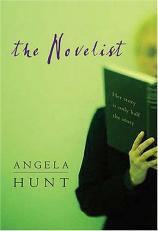The Novelist
Review
The Novelist
Christy Award winner Angela Hunt continues to churn out the goods with an uncommon twist, something she does with novel perspective and insightful grace. In this story, Hunt devises a clever scenario whereupon the protagonist, Jordan Casey Kerrigan --- the middle-aged female author of 20 bestselling spy novels --- decides to write an allegory in step with the community college writing class she is teaching. At the outset, Kerrigan faces some pretty potent verbal opposition from a male student who thoroughly thrashes her world-renown fictional hero. Taken aback, Kerrigan tries to see past the blatant criticism and privately wonders if her obnoxious student hasn't hit upon some measure of truth.
When her husband suggests a similar opinion, Kerrigan decides to take on the challenge of writing in a completely different genre, one that will open her veins like never before. Despite her initial angst, Kerrigan finds herself drawn to weaving a tale that mirrors the spiritual life journey her troubled young adult son, Zack, is currently living out by way of drinking, drugs, and outbursts of excesses and extremes of every emotional sort.
While Kerrigan's home front is characterized by the dips and dives of her clearly tortured son, Hunt finds solace and some peace in writing her concerns, observations and --- most obviously --- her weighted heart-burdens through her allegorical tale. Kerrigan steps into Paradise and, as the creator, writes in the main character William (the pseudonym for Zack). Day by day, Kerrigan explores the imaginary world of Paradise where she gives William the freedom to choose right from wrong, good or evil, allowing appropriate consequence to brim and overflow into the next. As real life concerns overshadow her professional life, Kerrigan continues to teach her college class, giving instruction on the how-tos of fiction in the making to eager students. She is suddenly on the learning end of the stick as she realizes how difficulties often force one to face up to hidden fears and the future unknown.
With adeptness, Kerrigan works out her spiritual take on making decisions, forfeiting others, and then coming to terms with the eventual outcomes by allowing her fictional character William to feel the brunt of his pain. Suffering along with her characters, Kerrigan prays that her allegory will touch a place within her son's heart, drawing him to Christ. As the writing class learns the mechanics of delivering a powerful message, so does Kerrigan --- painfully so. Only, she balks at God's instrument of delivery; when Zack attempts suicide, Kerrigan can no longer play the "fix-it" mother role. She finds herself upended, without recourse, and finally, a willing character in the story of her own life.
Readers will appreciate Hunt's ability to mesh these two storylines together: the fictitious Kerrigan life with the allegorical Kerrigan work in progress. Hunt asks the important questions throughout her text and then thoughtfully allows time and pages for these ideas to simmer before offering some conclusion. Perhaps the most poignant moments in this rendering occur when Hunt asks the introspective questions only a mother can understand, when she realizes she is powerless to make a difference and heal those she loves. Each transparent encounter is beautifully expressed and laden with gospel help and hope.
Reviewed by Michele Howe on January 10, 2006




